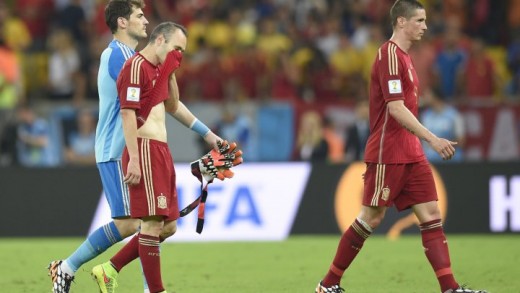 Prior to the 2014 World Cup tournament, it had been suggested that the Spanish squad contained several players who may be past their prime and that retaining the trophy may be a supremely difficult task. There is no doubting that the 2010 World Cup and 2008 / 2012 European Championship winners were a formidable team, but the manner in which they have been eliminated from the 2014 tournament by losing both group games to date is a much swifter fall from grace than expected.
Prior to the 2014 World Cup tournament, it had been suggested that the Spanish squad contained several players who may be past their prime and that retaining the trophy may be a supremely difficult task. There is no doubting that the 2010 World Cup and 2008 / 2012 European Championship winners were a formidable team, but the manner in which they have been eliminated from the 2014 tournament by losing both group games to date is a much swifter fall from grace than expected.
Perhaps the first seeds of doubt in the Spanish squad were sown in the 2013 Confederations Cup competition last summer when they were defeated 3-0 by Brazil in the final. That was by no means a vintage Brazilian team but it appeared that the ageing legs of several Spanish players had wilted during that final.
Since that defeat, Spain have only lost one full international but have never scored more than two goals in any match and appear to have lost the ability to open opposing defences with incisive passing. The midfield stalwarts Xavi and Andres Iniesta no longer dominate possession as in previous seasons and Xavi cannot command a regular place in the Barcelona starting eleven.
Many pundits will argue that with Spanish club football teams recently enjoying unprecedented success on the European stage, then that should be mirrored at an international level. It is true that the Madrid teams competed in the Champions League final and Sevilla clinched the Europa League but each of those teams comprises several noteworthy imports especially among the Real Madrid attacking contingent.
Additionally, Diego Costa has been drafted into the Spanish team after a very successful season as striker for champions Atletico Madrid but his form was handicapped by niggling injuries towards the end of the season which may partially explain why he has sometimes looked out of his depth at this level.
Blaming Costa for the pitfalls of this Spanish team would be inappropriate as manager Vincent del Bosque has been searching for that elusive regular goalscorer for some time and he has been fortunate to have such a reliable defensive unit at his disposal. That is, until now.
Spain only conceded two goals during the entire 2010 World Cup tournament but that was at a time when Carles Puyol was such an instrumental leader at the heart of the defence. His leadership and reading of the game can now be viewed as one the main ingredients of the success story of Spanish football in recent years. It is no coincidence that the recent relative decline of Barcelona has coincided with his lack of playing time this season and subsequent retirement.
The decline of the golden generation of Spanish footballers may help to explain their sudden and unexpected departure from the 2014 World Cup tournament but they always be remembered for their quality and cultured football when performing at their peak.
